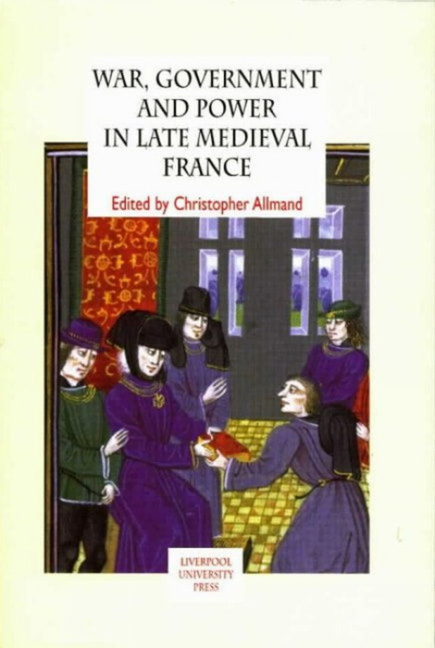Book contents
- Frontmatter
- Contents
- Dedication
- Acknowledgements
- Abbreviations
- Introduction
- 1 From the Court of Hainault to the Court of England: The Example of Jean Froissart
- 2 Froissart and his Second Book
- 3 Alain Chartier and the Arts of Crisis Management, 1417–1429
- 4 Intellectual Patterns and Affective Reactions in Defence of the Dauphin Charles, 1419–1422
- 5 War, Propaganda and Diplomacy in Fifteenth-Century France and England
- 6 History and the Literature of War: The Boke of Noblesse of William Worcester
- 7 Commynes on Kingship
- 8 ‘Centre’, ‘Power’ and ‘Periphery’ in Late Medieval French Historiography: Some Reflections
- 9 Centre and Periphery in Late Medieval France: Tournai, 1384–1477
- 10 ‘Decayed Feudalism’ and ‘Royal Clienteles’: Royal Office and Magnate Service in the Fifteenth Century
- 11 Justification and Theory of the Death Penalty at the Parlement of Paris in the Late Middle Ages
- 12 Membra disjecta of the Breton Chambre des Comptes in the Late Middle Ages: Treasures Revisited and Rediscovered
- Glossary
- Index
4 - Intellectual Patterns and Affective Reactions in Defence of the Dauphin Charles, 1419–1422
- Frontmatter
- Contents
- Dedication
- Acknowledgements
- Abbreviations
- Introduction
- 1 From the Court of Hainault to the Court of England: The Example of Jean Froissart
- 2 Froissart and his Second Book
- 3 Alain Chartier and the Arts of Crisis Management, 1417–1429
- 4 Intellectual Patterns and Affective Reactions in Defence of the Dauphin Charles, 1419–1422
- 5 War, Propaganda and Diplomacy in Fifteenth-Century France and England
- 6 History and the Literature of War: The Boke of Noblesse of William Worcester
- 7 Commynes on Kingship
- 8 ‘Centre’, ‘Power’ and ‘Periphery’ in Late Medieval French Historiography: Some Reflections
- 9 Centre and Periphery in Late Medieval France: Tournai, 1384–1477
- 10 ‘Decayed Feudalism’ and ‘Royal Clienteles’: Royal Office and Magnate Service in the Fifteenth Century
- 11 Justification and Theory of the Death Penalty at the Parlement of Paris in the Late Middle Ages
- 12 Membra disjecta of the Breton Chambre des Comptes in the Late Middle Ages: Treasures Revisited and Rediscovered
- Glossary
- Index
Summary
The double-monarchy created by the Treaty of Troyes was to cause contemporaries to ask many different questions regarding its implementation even before the premature and unforeseen death of Henry V while still regent of France. As Jean Favier has written, it is clear that the policies of Queen Isabeau, Philip the Good and Henry V were formulated on the understanding that the dauphin, Charles, should ‘disappear from circulation’.The reality would be very different: the dauphin still enjoyed much support, particularly in parts of the country south of the Loire, although this was a part of France which, generally speaking, contained few economic resources.
Among the causes leading to the final victory achieved by Charles VII may have been the death of Henry V. In seeking to impose his rule and to achieve the union of the two crowns of England and France, Henry held two trump cards: his military superiority and his political acumen. Nor did he lack admirers, even among the subjects of Charles VI. At the end of 1417 the humanist, Nicolas de Clamanges, addressed the King of England in an Epistola exhortatoria ad iusticiam et alias virtutes in which he set out the king's numerous virtues – piety, a sense of justice, moderation, and a cultured mind (very important to Clamanges) – which made him into ‘the person by whom the house of France shall be revived, rebuilt and recalled to its former greatness’. On Henry's death, Jean Chartier, now responsible for writing the Chronique de Saint-Denis, painted this favourable image of the late king:
he showed much magnanimity, valour in arms, prudence and wisdom: he was a great justiciar, and earned a reputation as such among the people: he was held in awe and honour by all … In his lifetime, no other prince appeared more capable than he of subduing or conquering a kingdom by the wisdom of his rule, by his good sense and the other qualities with which he was endowed.
Not all, however, agreed with this view. Some regarded the king with a violent hatred which it would prove difficult to extinguish.
- Type
- Chapter
- Information
- War, Government and Power in Late Medieval France , pp. 54 - 69Publisher: Liverpool University PressPrint publication year: 2000



